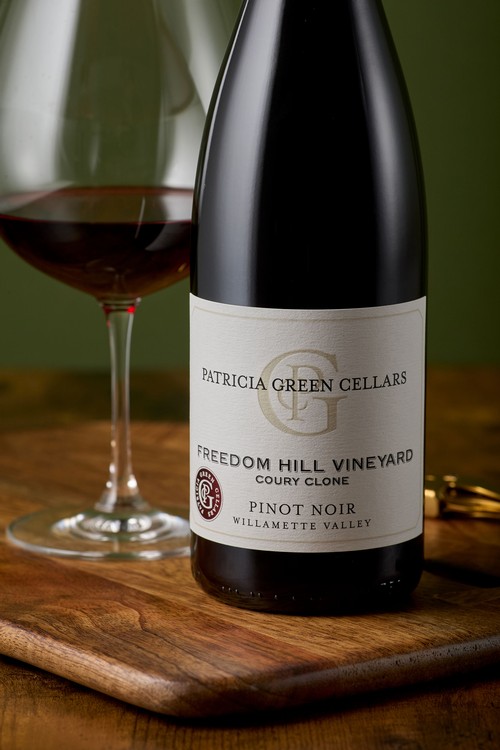2022 Freedom Hill Vineyard, Coury Clone Pinot Noir 9L
96 Points

96 Points - VinousWinemaking and Notes: This section of the vineyard was planted in 2000 and the cuttings came from the 1972 section of Coury Clone at Hyland Vineyard. What all this amounts to is that this is one of the most fascinating single vineyard bottlings we make on a yearly basis. Coury Clone is definitely something that leads with the nose first and foremost. To ensure that this feature is as prominent and beautiful as possible we have been using 35-50% whole cluster fermentations since our first vintage working with the fruit in 2012. We used 50% whole clusters again in 2018. It works, and in excellent vintages like 2018 the aromatics are especially intoxicating and unique. This bottling shows the flipside of Freedom Hill Vineyard which is known for power, intensity, sap-laden wines with lots of structure. This is graceful and aromatic, and while intense, it is discreetly so. Amongst the staff at Patricia Green Cellars this particular bottling is a distinct favorite.
Wine history: The agricultural history of this area near Salem dates back to the mid-1850s, though it wasn't until the 1970s that winemakers started to discover the area as having ideal growing conditions for high-quality wine grapes. It was around this time that a few modern pioneers, including Don Byard of Hidden Springs, planted a patchwork of vineyards in the Eola-Amity Hills. Soon after, other pioneers followed suite and today this area produces world-class, handcrafted cool-climate varietals. The appellation became official in 2006.
Climate: The Eola-Amity Hills region enjoys a temperate climate of warm summers and mild winters, and 40 inches of annual rain, most of which falls outside of the growing season. Average maximum temperatures are 62 degrees Fahrenheit in April and 83 degrees Fahrenheit in July, which contributes to the ideal conditions for the cool-climate grape varieties that dominate the Eola-Amity Hills. The climate in this region is greatly influenced by its position due east of the Van Duzer Corridor, which provides a break in the coast range that allows cool Pacific Ocean air to flow through. This drops temperatures in the region dramatically, especially during late summer afternoons, helping to keep grape acids firm.
Soil: The soils in the Eola-Amity Hills predominantly contain volcanic basalt from ancient lava flows as well as marine sedimentary rocks and alluvial deposits at the lower elevations of the ridge. This combination results in a relatively shallow, rocky set of well-drained soils, which typically produce small grapes with great concentration.
Topography: The Eola Hills, and its northern extension, the Amity Hills, are part of a North Willamette Valley hill chain that developed out of intense volcanic activity and the collision of the Pacific and North American plates. The main ridge of the Eola Hills runs north-south and has numerous lateral ridges on both sides that run east-west. The majority of the region's vineyard sites exist at elevations between 250 to 700 feet.
Site Characteristics: Freedom Hill Vineyard lies toward the eastern edge of the Coast Range Foothills. While associated geographically with the Eola Hills the site lies south and west of the border of the Eola-Amity Hill Appellation outside the town of Monmouth. The vineyard is planted on a marine sedimentary type of soil known as Bellpine. The vineyard is also located just south of the Van Duzer wind corridor which allows for more consistent average temperatures due to a lack of afternoon and evening offshore breezes rolling through. The vineyard was established in 1982 by the people who still own and manage it to this day, Dan and Helen Dusschee. While they may not have realized it at the time they were ultimately settling onto a site destined to be seen as one of the top Pinot Noir vineyards in the state of Oregon. Their rigorous and professional approach to the management of the vineyard has brought about that greatness and even though the vineyard suffered through a scourge of phyloxera replantings and expansion of the site have shown that there is a clear and indomitable of terroir here. We had the great fortune of being in the right place at the right time with the right need for fruit in 2012 and we have had the great fortune to produce what we consider to be some of the greatest and most focused Pinot Noirs we have ever made.
Coury Clone Pinot Noir has a fascinating background tale that is literally rooted in the earliest history of the Oregon wine industry. The short version of the story is that Charles Coury submitted his master’s thesis for cool climate winegrowing to the University of California at Davis while studying in Alsace, France in 1964. He brought vine cuttings back to the U.S. when he returned to Oregon that summer. From this small and straightforward beginning, the plantings and legend of the Coury Clone begins. For a full and detailed account of this very, very interesting agricultural story that was lost to history for some time, please go to The Price of Pinot’s website (http://www.princeofpinot.com/article/1214/) and read for yourself.
AVA: Willamette Valley LOCATION: Burnell Rd., Dallas, OR
ELEVATION: 500’ SOIL TYPE: Bellpine
YEAR PLANTED: 2000
CLONAL MATERIAL: 100% Coury VINEYARD SIZE: 85-acre vineyard, 1.1-acre PGC block
VINIFICATION: 2.5-ton open-top fermenters done with 100% whole cluster and 35% whole cluster fermentations.
PICKING DATE: 09/30/18 TONS/ACRE: 3.16
OWNERS: Dan and Helen Dusschee PRODUCTION: 229 cases bottled

